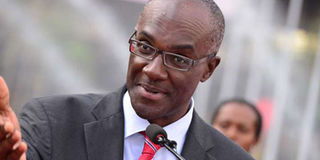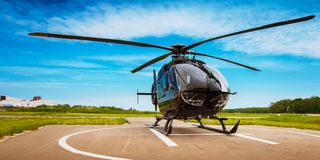
Mr buvi Ngunze, chairman of the Kenya Association of Air Operators.
Air operators have warned that the Finance Bill, 2025 re-introduces significant tax provisions that will negatively affect the aviation sector.
Mr Mbuvi Ngunze, the chairman of the Kenya Association of Air Operators (KAAO), told the National Assembly's Finance and National Planning Committee that the proposed imposition of 16 percent value added tax (VAT), Railway Development Levy (RDL) and the Import Declaration fees (IDL) on importation of aircraft, spacecraft and parts will result in operators losing their competitiveness due to increased costs of purchase, leasing or financing of the equipment. The new taxes will cripple the aviation industry, he added.
He said the passage of the Bill as drafted by the Treasury will lead to increased operational costs for local air operators, Approved Maintenance Organisations (AMOs), and related aviation service providers who will now face 3.5 percent more on import costs including the 1.5 percent IDF and 2 percent RDL.
"The Finance Bill 2025 seeks to reintroduce VAT, Import Declaration Fees (IDF), and Railway Development Levy (RDL) on aircraft, parts, and maintenance services—measures that would fundamentally alter the cost structure of aviation in Kenya," Mr Ngunze said.
"To safeguard economic growth, environmental goals, and regional leadership, it is imperative that Parliament upholds existing VAT, IDF, and RDL exemptions, aligning with International Civil Aviation Organisation (ICAO) and East African Community ( EAC) frameworks. This will ensure Kenya remains at the forefront of aviation innovation in Africa."

The re-introduces significant tax provisions that will negatively affect the aviation sector.
Mr Ngunze said the restoration of long standing Value Added Tax (VAT) exemptions on aviation-related goods and services, including aircraft, spare parts and maintenance equipment, RDL and IDF fees, and additionally withholding tax on exported goods will affect safety and competitiveness of civil aviation.
"Chapter 88 of the East African Customs Union Common External Tariff covers aircraft, spacecraft and parts thereof. By limiting this exemption to aircraft above 2,000Kgs, this disadvantages all other aviation equipment including spare parts under chapter 88 which are essential," Mr Ngunze said.
He told the committee chaired by Molo MP Kiuria Kimani that tax exemptions were given to the aviation sector of the IDF and RDL on the clear understanding that this supported its relative competitiveness and efficiency in the region.
Mr Ngunze said the exemptions are an essential part of the industry cost structure as most of the revenues are not Vatable, meaning no offsets possible, thus having a direct impact on cash flows and operational costs.
Significant losses
"These exemptions have been instrumental in supporting sector recovery and growth following the Covid-19 pandemic, facilitating the restoration of passenger and cargo volumes, fleet modernisation, supporting humanitarian services, and reinforcing Kenya’s position as a key aviation hub in East Africa," he said.
"Needless to say, the sector incurred significant losses through the Covid-19 period, and policy support initiatives to stabilise the industry were much needed."
Mr Ngunze wants Parliament to delete the proposed taxes from the Finance Bill to ensure safety and competitiveness of civil aviation.
""The Finance Bill, 2025re-introduces significant provisions that will negatively affect the aviation sector," Mr Ngunze said during the public participation exercise on the Bill.
"We request that you reinstate exemption of VAT on all goods of Chapter 88 and other spacecraft."

The National Assembly.
He said the impact of the taxes will lead to increased costs on importation of aircraft, aircraft engines and parts such as propellers, rotors, and undercarriages.
Mr Ngunze said the proposed Bill will lead to increased cost of maintenance leading to increased operational costs which will ultimately be borne by the travelling public impacting
Kenya’s aviation sector competitiveness.
He warned that cost increases deter airlines from timely maintenance and purchase of uncertified parts impacting safety.
Mr Ngunze said international Air Transport is different since its global nature justifies exemption of VAT, RDL, IDF among other taxes for an even playing field
He said the proposed taxes are directly contrary to the government’s own ambition of job creation enumerated in Bottom Up Economic Agenda (Beta), and sustainability for a sector that has a direct multiplier effect on the economy.
"The introduction of 16 percent VAT on importation of aircraft, spacecraft and parts thereof under Chapter 88 will result in Kenyan operators losing their competitiveness due to increased costs of purchase, leasing or financing of these equipment," Mr Ngunze said.
"This in turn will result in increased operational costs which will be cascaded down to the
consumers and the public travelling. It may also lead to safety concerns deterring airlines from timely maintenance therefore impacting safety."
He said increased costs will also discourage investors from registering aircraft in the Kenyan registry, which will impact revenue generated by the Kenya Airports Authority and Kenya Civil Aviation Authority in the form of fees and charges.
Mr Ngunze asked MPs that the introduction of 16 percent VAT on direction-finding compasses, instruments and appliances for aircraft will result in higher cost for aircraft maintenance, which has a safety implication as the costs will be extremely high.
"This will have a negative impact on local aircraft maintenance organisations since it will be cheaper to outsource maintenance activities in other countries within the region thereby making Kenya uncompetitive. This will result in the loss of jobs," he said.
"The risk includes increased costs for the entire aviation sector due to VAT on aircraft spare parts and other goods of chapter 88."
Mr Ngunze asked the committee to reinstate exemption from VAT on all goods of Chapter 88 above and any other aircraft spare parts to cover those that are not under Chapter 88.
He said higher maintenance and safety costs will lead to longer aircraft downtimes, use of older aircraft, or cutting of services to low-traffic regions—ultimately weakening air connectivity, especially for humanitarian and medical services.
Mr Ngunze said the taxation will result in negative spillover effects on sectors dependent on aviation such as tourism, film and photography, humanitarian, aviation training and undermines Kenya’s status as a regional aviation hub, especially compared to Ethiopia,
Rwanda, and South Africa—who maintain targeted exemptions to boost the industry.








